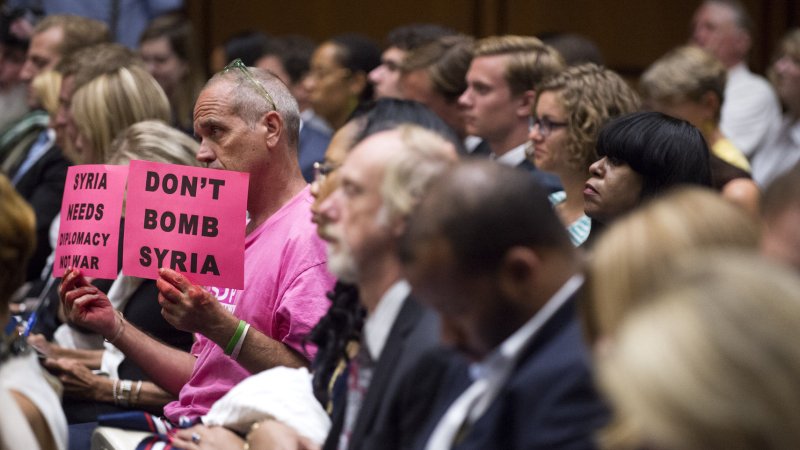A protester sits in a Senate Foreign Relations Committee hearing on military intervention in Syria with Secretary of State John Kerry and Defense Secretary Chuck Hagel, on Capitol Hill in Washington, D.C. on September 3, 2013. UPI/Kevin Dietsch |
License Photo
UNITED NATIONS, Sept. 4 (UPI) -- Demonstrators outside the U.S. Embassy in Moscow Wednesday protested a push by U.S. leaders toward a military response over use of chemical weapons in Syria.
The situation in Syria also threatens overshadow economic development issues when the Group of 20 begins its 2-day summit Thursday in St. Petersburg, Russia, observers told The Washington Post.
The summit's host, Russian President Vladimir Putin, is at odds with U.S. President Barack Obama about whether military force should be used in response to evidence that forces loyal to President Bashar Assad used chemical weapons on fellow Syrians. Putin, a key Assad ally, has pressed his case for no strikes while Obama advocates a response is justified, the Post reported Tuesday.
Anders Aslund, a Russia specialist at the Peterson Institute for International Economics, told the newspaper Obama faces huge risks by attending the summit.
"I think that this will be really a trap that President Obama is getting into for no good reason," Aslund said. "When there is an event like this, the Russians are in charge. The host is always in charge, and there's nothing that President Obama can accomplish in St. Petersburg. He has no support for Syria there. He will only get beaten up over it."
In Moscow Wednesday, supporters of the Liberal Democratic Party of Russia, led by opposition leader Vladimir Zhirinovsky, rallied in front of the U.S. Embassy in Moscow, calling the United states "a world gendarme," ITAR-Tass reported.
"The United States has adopted practically all the decisions on attacking Syria. On Wednesday, the international [foreign relations] committee of the U.S. Congress will pass its resolution and on Monday, they will say OK to the liquidation of Syria," Zhirinovsky said.
Congress returns to Washington on Monday after its August recess, although several committees are meeting this week for hearings on Obama's authorization request.
While at the G20 summit, Obama is to meet with French President Francois Hollande and Chinese President Xi Jinping, U.S. officials said.
But analysts concede it will be difficult for Obama to gain support on Syria as long as there is uncertainty about the scope of possible airstrikes or about whether the U.S. Congress will authorize them.
"He's going over there, he wants their support on Syria, but for them it's like, 'Until your Congress says, 'yes,'" Mark Katz, a Russia analyst at George Mason University, told the Post. "For risk-averse politicians, why go out on a limb? They don't want to state their support for the use of force against Syria and then have Obama not do it."
In Washington, Obama's national security adviser Susan Rice told NBC News she has no doubts about Obama's authorization request to launch punitive air strikes against Assad's regime will be approved.
"We think that the Congress of the United States and the American people understand that we have compelling national interests at stake here," said Rice, the former U.S. ambassador to the United Nations.
"If the chemical weapons are used -- randomly and wantonly, as they have become to be by Assad -- that threatens very important partners of the United States," Rice told NBC News.
British Prime Minister David Cameron backs action against the Syrian regime, but the British Parliament last week nixed any military action. In France, Hollande signaled support as well, although his country's lawmakers are debating the issue.
Putin has given Assad's government military and economic support throughout the country's civil war that began as peaceful anti-government demonstrations in March 2011. He has spoken against a U.S.-led strike in retaliation for the Assad regime's alleged use of chemical weapons to kill hundreds of civilians in August in the suburbs of Damascus.
As permanent members of the U.N. Security Council, Russia and China, another key Assad ally, have blocked anti-Syrian resolutions.
In a televised statement Tuesday, U.N. Secretary-General Ban Ki-moon called on the U.N. Security Council to unite to develop an appropriate response if the allegation of chemical weapons use proves true.
"The Security Council has a duty to move beyond the current stalemate and show leadership," Ban said. "This is a larger issue than the conflict in Syria; this is about our collective responsibility to humankind."
Ban said he would use the Group of 20 summit in St. Petersburg, Russia, to "engage with world leaders on this tragedy, including humanitarian assistance."















